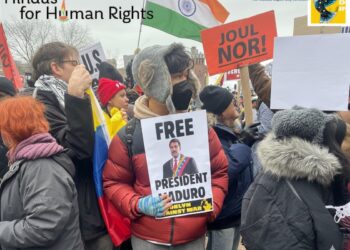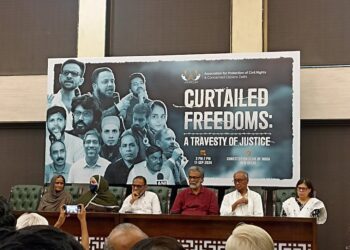A prominent Sikh house of worship in California has called on the United States Department of Justice to investigate the Hindu American Foundation (HAF) over its alleged coordination with the Indian government, escalating tensions within the Indian diaspora and raising fresh questions about foreign influence in American politics.
The Gurdwara Sahib Fremont, located in the Bay Area city of Fremont, has filed a formal complaint urging the DOJ’s National Security Division to determine whether HAF should register as a foreign agent under the Foreign Agents Registration Act (FARA). The complaint, submitted through Texas-based law firm Lex Politica, cites what the Gurdwara describes as a “fiduciary relationship” between HAF and the Indian embassy in Washington, DC — a term legal experts say could be central to triggering FARA obligations.
Allegations of coordination with Indian government
The latest claims, first reported by Mother Jones, stem from a legal note shared by the Gurdwara last month, based on documents obtained through public records requests in India. The documents include a refusal by the Indian embassy to release email communications with HAF, citing that disclosure would “irreparably breach” the trust between the embassy and the foundation. The embassy’s response also described certain information as “fiduciary” in nature.
Prabhjot Singh, a spokesperson for the Fremont Gurdwara, told Mother Jones that these revelations, along with HAF’s documented history of liaising with Indian officials and American politicians, convinced the temple’s leadership to pursue legal action.
“Given its ‘fiduciary’ relationship with the Indian Embassy, [HAF] appears to be acting in alignment and in coordination with a foreign government,” Singh said. “It strikes at the heart of American sovereignty, civil rights, national security — all of those things are influenced by this.”
The complaint argues that HAF has “consistently and unequivocally advocated for the interests” of India’s ruling Bharatiya Janata Party (BJP) on both domestic and foreign policy issues. It cites HAF’s involvement in organising events and briefings with Prime Minister Narendra Modi and Indian diplomats, including during Modi’s high-profile US visits in 2014, 2019, and 2024.
HAF also reportedly helped coordinate a 2019 Capitol Hill briefing with the Indian embassy, distributing materials that downplayed religious violence in India while omitting the role of Hindu nationalist paramilitary groups, the complaint alleges.
Foreign influence laws under scrutiny
The Foreign Agents Registration Act requires individuals and organisations acting on behalf of foreign governments to disclose their activities and financial ties. While advocacy for foreign governments is legal, experts say the existence of a fiduciary or coordinated relationship may trigger FARA requirements.
Ben Freeman, director of the Democratizing Foreign Policy program at the Quincy Institute, told Mother Jones that FARA enforcement remains “murky,” but that financial ties and patterns of coordination are critical factors.
“If there’s an ongoing relationship where the foreign principal yields some level of power over the agent, that’s where it becomes a FARA issue,” Freeman explained.
HAF rejects complaint as “dual loyalty smear”
HAF has categorically denied the allegations, describing them as a politically motivated attack linked to its opposition to the Khalistan movement, which seeks an independent Sikh state.
“HAF condemns this latest dual loyalty smear and categorically rejects the ludicrous allegation that HAF coordinates its activities with the Government of India, or that it is in violation of FARA registration requirement, or any other relevant law,” the organisation said in a statement.
In a follow-up post on X (formerly Twitter), HAF described the complaint as “the latest dangerous escalation by pro-Khalistan extremists,” alleging that Sikh activists are targeting the foundation for its advocacy work against what HAF calls a “fundamentally anti-Hindu” separatist movement.
The Fremont Gurdwara has been active in supporting Sikh self-determination causes in the US and internationally, including the global Khalistan referendum campaign, which has drawn sharp criticism from pro-Modi groups and the Indian government.
Broader context of Indian transnational repression
The FARA complaint comes amid heightened international concern about India’s efforts to suppress dissent abroad, particularly among Sikh activists. Canadian authorities last year linked Indian officials to the assassination of Sikh activist Hardeep Singh Nijjar in British Columbia. US prosecutors also charged an alleged Indian government agent with plotting to assassinate Sikh American lawyer Gurpatwant Singh Pannun in New York.
These incidents prompted US lawmakers to introduce the Transnational Repression Reporting Act, aimed at enhancing transparency around foreign governments targeting dissidents on US soil.
HAF, one of the most well-funded and influential Hindu advocacy groups in the US, has faced previous accusations of advancing the BJP and Hindu nationalist agenda. Scholars and civil rights groups have linked HAF to a network of right-wing organisations, including the Rashtriya Swayamsevak Sangh (RSS), a paramilitary group widely regarded as the ideological backbone of Modi’s government.
A 2024 Al Jazeera investigation found that HAF was “treading a fine line” between operating as a nonprofit and acting as a de facto foreign agent, though HAF denied any formal links to the Indian government.
DOJ yet to respond
The Indian embassy has not commented publicly on the latest allegations. HAF has signalled its willingness to meet with the DOJ, FBI Director Kash Patel, and former US Congresswoman Tulsi Gabbard to address what it calls “dangerous accusations.”
The Department of Justice has yet to indicate whether it will launch a formal investigation.
For many Sikh Americans, however, the complaint reflects growing alarm about what they see as an increasingly emboldened Hindu nationalist presence in US politics.
“American democracy shouldn’t be undermined by foreign governments through proxies,” Singh said.











